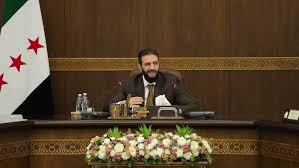Ahmad al-Sharaa, Syria’s transitional president, declared on Saturday that the country is moving decisively toward encouraging investment, describing the current moment as an exceptional phase presenting an opportunity Syria has not witnessed in half a millennium.
Speaking during a regular government meeting in Damascus, Sharaa emphasised that the primary focus of investment promotion is on infrastructure-related sectors—those requiring significant capital and long-term returns. He acknowledged that Syrian domestic investments alone are insufficient to meet these demands, thus necessitating the attraction of regional and international investors.
Sharaa revealed that the Investment Law, discussed around ten days ago, has now been finalised with the necessary amendments and is awaiting formal approval before issuance in the near future.
“This is not the time for titles, but for work,” Sharaa said, calling for a shift from personal ambition to national responsibility. He urged officials to adopt the spirit of public service over the pursuit of appearances.
He outlined a broad range of sectors open to investment, including airports, energy, tourism, oil and minerals, free zones, ports, railways, and real estate. He also highlighted opportunities in reconstruction, industry, agriculture, telecommunications, and road networks, noting strong interest from investors in these areas.
The president stressed that the government’s newly launched campaign against poverty demands inter-institutional cooperation—especially through reforms in the education sector and the integration of modern technologies. Human capital, he noted, remains central to enhancing productivity and bolstering the economy.
Sharaa also underlined the importance of improving basic services such as healthcare, water, and electricity, and called for targeted investment in these areas to relieve state burdens and accelerate infrastructure recovery. He advocated for an investment environment grounded in clarity and trust, facilitated by transparent legislation, a unified investment window, and real incentives, particularly around the freedom to transfer profits and capital abroad—a departure from earlier regulations that restricted capital movement.
Addressing export capacity, he noted that boosting production and securing export markets, especially in industry, agriculture, and drama production, would inject significant liquidity into the economy, thereby strengthening the state’s ability to combat poverty and drive growth.
He also acknowledged the inseparability of security and development, praising the Interior Ministry and General Intelligence Directorate for their continued efforts. He called for vigilance in security matters without exaggeration or complacency.
“We came to power through a revolution—one that cost us dearly in blood,” Sharaa concluded. “We are not men of palaces, nor are we accustomed to luxury offices or chauffeur-driven cars.”
Saudi–Syrian Relations Strengthen
Sharaa’s remarks coincided with the visit of Saudi Foreign Minister Prince Faisal bin Farhan, who arrived in Damascus on Saturday leading a high-level economic delegation.
Following a meeting with his Syrian counterpart Assaad al-Shibani, bin Farhan said the discussions with Sharaa focused on exploring opportunities to strengthen bilateral cooperation. He expressed Saudi Arabia’s desire to deepen its partnership with Syria, emphasising the country’s immense potential and capacity for self-recovery.
He also reiterated Saudi Arabia’s support for lifting sanctions, calling it “a testament to brotherhood and solidarity.”
On the same day, Saudi Arabia and Qatar jointly announced financial support for Syrian public sector employees, to be disbursed over the next three months. In a joint statement, the two Gulf states affirmed their commitment to Syria’s stability and their intention to alleviate the humanitarian suffering of its people.
This article was translated and edited by The Syrian Observer. The Syrian Observer has not verified the content of this story. Responsibility for the information and views set out in this article lies entirely with the author.


